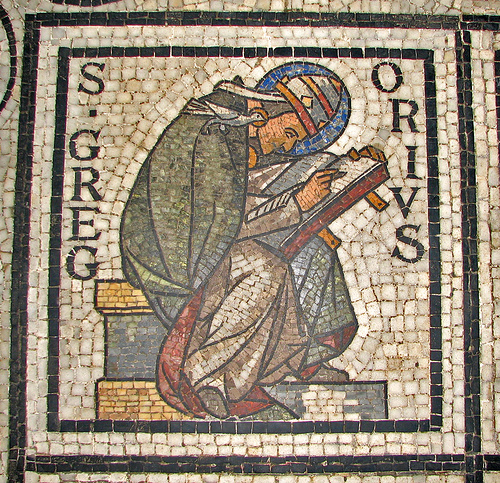Seleccionar idioma español/Choisissez la langue français
Only two popes, Leo I and Gregory I, have been given the popular title of "the Great." Both served during difficult times of barbarian invasions in Italy; and during Gregory's term of office, Rome was also faced with famine and epidemics.
Gregory was born around 540, of a politically influential family, and in 573 he became Prefect of Rome; but shortly afterwards he resigned his office and began to live as a monk. In 579 he was made apocrisiarius (representative of the Pope to the Patriarch of Constantinople). Shortly after his return home, the Pope died of the plague, and in 590 Gregory was elected Pope.
Like Leo before him, he became practical governor of central Italy, because the job needed to be done and there was no one else to do it. When the Lombards invaded, he organized the defense of Rome against them, and the eventual signing of a treaty with them. When there was a shortage of food, he organized the importation and distribution of grain from Sicily.
His influence on the forms of public worship throughout Western Europe was enormous. He founded a school for the training of church musicians, and Gregorian chant (plainchant) is named for him. The schedule of Scripture readings for the various Sundays of the year, and the accompanying prayers (many of them written by him), in use throughout most of Western Christendom for the next thirteen centuries, is largely due to his passion for organization. His treatise, On Pastoral Care, while not a work of creative imagination, shows a dedication to duty, and an understanding of what is required of a minister in charge of a Christian congregation. His sermons are still readable today, and it is not without reason that he is accounted (along with Ambrose, Jerome, and Augustine of Hippo) as one of the Four Latin Doctors (=Teachers) of the ancient Church. (Athanasius, Gregory of Nazianzen, Basil the Great, and John Chrysostom are the Four Greek Doctors.)
English-speaking Christians will remember Gregory for sending a party of missionaries headed by Augustine of Canterbury (not to be confused with the more famous Augustine of Hippo) to preach the Gospel to the pagan Anglo-Saxon tribes that had invaded England and largely conquered or displaced the Celtic Christians previously living there. Gregory had originally hoped to go to England as a missionary himself, but was pressed into service elsewhere, first as apocrisiarius and then as bishop of Rome. He accordingly sent others, but took an active interest in their work, writing numerous letters both to Augustine and his monks and to their English converts.
I here mention something that was not Gregory's doing, but is an important part of Church history. It was in Gregory's lifetime that Rome, and with it the Western Empire, with astonishing suddenness, and for no reason that I know of, went monolingual. For more than six centuries previously, Greek had been spoken at Rome along with Latin. Every Roman with pretensions to being educated could speak it. Everyone involved in shipping and commerce, from banker to stevedore, could speak it. The list of the early Bishops of Rome has a fair proportion of Greek names. When Paul wrote an epistle to the Romans, he wrote in Greek as a matter of course. But in Gregory's lifetime this changed. Gregory was ambassador to the Eastern Patriarch at Constantinople for six years, but he never bothered to learn Greek. And in his day (not, as far as I have any reason to believe, as a result of his example or influence) most other Latin-speakers did not trouble to learn Greek either. The already existing difficulties of communication between Latin and Greek theologians were greatly exacerbated by this development. Increasingly, Latins did not read the commentaries and other writings of Greek Christians, and vice versa. Thus differences between the two that dialogue might have resolved were left to accumulate, culminating in the formal split between Latin and Greek Christendom in 1054 (Great Schism).
If I were to select a ground on which this devout Christian of great accomplishments might reasonably be censured, it would be that his Dialogues, a book on the lives of the saints, is full of accounts of dreams and visions that various persons were said to have had of souls in Purgatory. Gregory, a man of keen critical judgement on many matters, was completely uncritical in his acceptance of these stories. A general belief in Purgatory was standard among Christians when he wrote; but his reliance on "ghost stories" to fill in the imaginative details gave the doctrine as held thereafter in Latin Christendom both a prominence and a coloring that it had not previously had, with results that many Christians, including adherents of the Pope, have thought regrettable.
Almighty and merciful God, who raised up Gregory of Rome to be a servant of the
servants of God, and inspired him to send missionaries to preach the Gospel
to the English people: Preserve in your Church the catholic and apostolic faith
they taught, that your people, being fruitful in every good work, may receive the
crown of glory that never fades away; through Jesus Christ our Lord, who lives
and reigns with you and the Holy Spirit, one God, for ever and ever. Amen.
